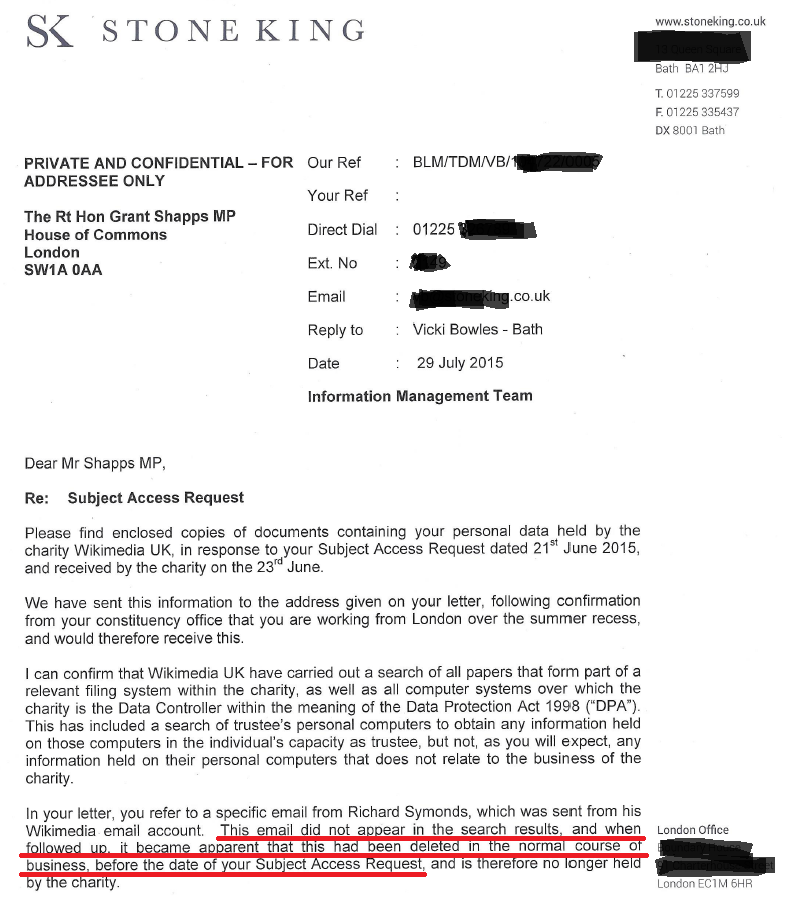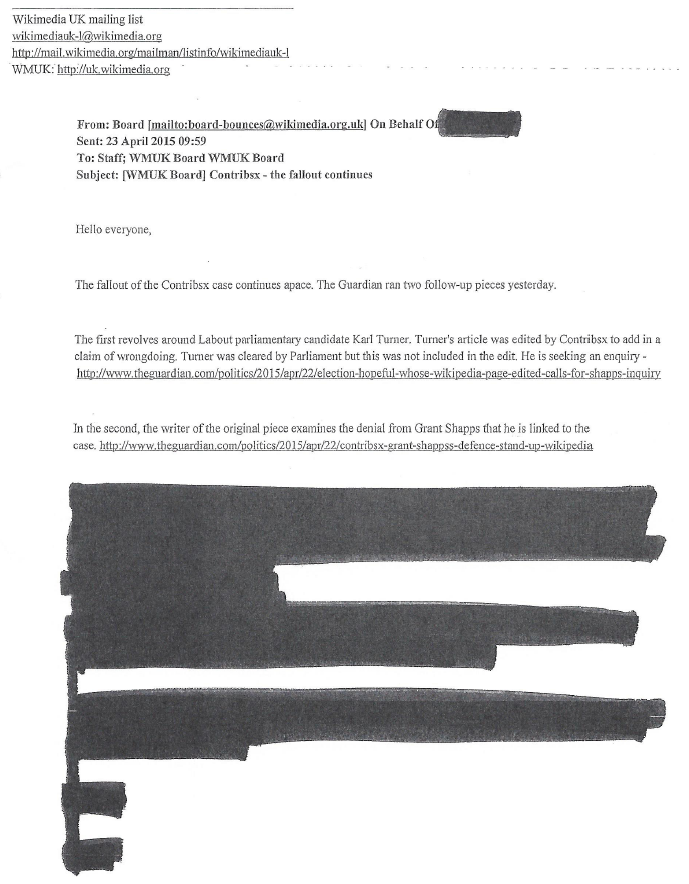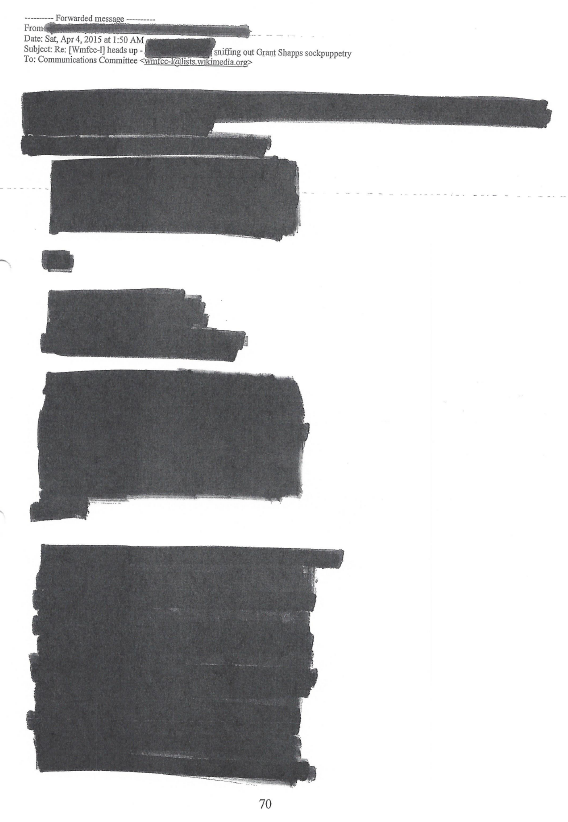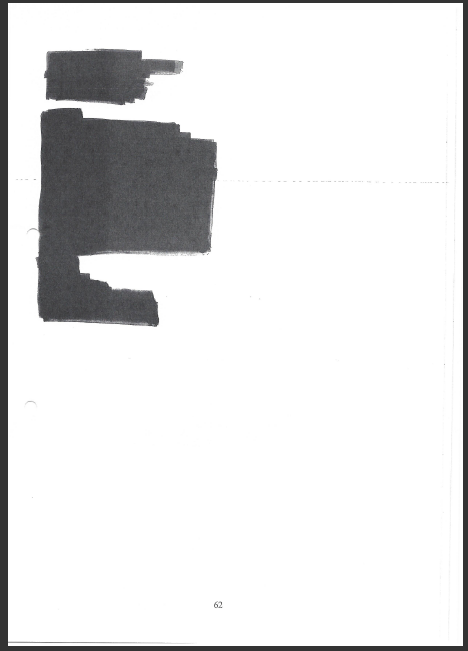In a recent article I revealed that after being wrongly accused of sock-puppetry and backstabbing colleagues by Richard Symonds, a staffer at Wikimedia UK, British MP Grant Shapps had served a disclosure request under the Data Protection Act 1998 (DPA). Shapps has had a response, of sorts. It makes grim reading.
The great thing about data protection requests? They are not litigation correspondence, they are not subject to the implied undertaking / CPR 31.22 and they do not usually engage a duty of confidentiality. Other parties may not ordinarily impose a duty of confidence on documents disclosed under a statutory duty. So we can start by sharing this little gem –

What sort of organisation fails to retain legally sensitive materials like allegations against Cabinet ministers?
According to Wikimedia UK Symonds has deleted his email to the Guardian ‘in the normal course of business’. This is a very concerning statement. Most organisations have clear data retention policies. Does Wikimedia have no such policy or does it not follow it? Does it really manage personal data so poorly? Another concern is that most organisations have email backups. Does Wikimedia or its provider not back up its email server? That is a serious governance concern.
Another problem for Wikimedia is that Shapps made clear he was contemplating litigation immediately after the story broke, saying, “This smear is categorically false and defamatory” (archive here). The law takes a harsh view of documents relevant to litigation being destroyed.
The legal principle of relevance is called, “omnia praesumuntur contra spoliatorem” – ‘all things are presumed against the destroyer of evidence’. The recent case of Earles v Barclays Bank Plc [2009] EWHC 2500 (Mercantile), established that whilst there was no general duty to retain documents prior to proceedings being commenced, “[…] that “there might be cases where it was appropriate to draw adverse inferences from a party’s conduct before the commencement of proceedings.”” (paragraph 28).
I imagine that Wikimedia’s lawyers will double check and either have a very good explanation of how the documents were destroyed in ‘the normal course of business’ or perhaps they will find a backup.
Even if the email has been destroyed it hardly helps them. Shapps already has key extracts from the emails, courtesy of the Guardian. I published them in my earlier article here. Wikimedia also disclosed a large number of emails from the same time period to Shapps. Oddly these had not been destroyed in ‘the normal course of business’. Not that Wikimedia UK have been entirely forthcoming with these, relying on a number of exceptions to the DPA.
Some of the documents are so redacted they could be mistaken for releases from the Pentagon – or perhaps modern art. I have named the next three moving pieces as though they were abstract paintings – “Openness”, “Transparency” and “Accountability”.
Of course Shapps and his nightmarish lawyers are simply handing WMUK rope. He already has key documents. He has indicated he is contemplating defamation proceedings. The very detailed ArbCom judgement (admissible in the UK under s1 Civil Evidence Act 1995), is hardly helpful to any claim that Symonds, the Guardian or WMUK were publishing responsibly or in the public interest.
Should he choose to proceed, Shapps can easily force WMUK to disclose unredacted materials. The obvious next step is a letter of claim and a pre-action disclosure request .The two main differences between a pre-application disclosure request and a data protection requests are –
- none of the Data Protection exemptions apply
- Shapps is not allowed to leak the results, at least not without asking the Court for permission
Under the circumstances, making a DPA request first made perfect tactical sense. WMUK have simply wasted money to pay Stone King to spend hours redacting documents and making themselves look bad when Shapps knows he can get all of them in unredacted form (and more) anyway.
WMUK has clearly behaved in a deeply unjust manner towards Shapps. Even after the damning Arbcom ruling Symonds states he stands by his original allegations on his Wikipedia page (archive here). D’Arcy Myers has refused to apologise. It is quite possible if Shapps succeeds in defamation proceedings individual staffers at WMUK stand to lose their homes. If D’Arcy Myers authorised any publication he better start being really, really nice to Grant Shapps.
It may be, however, that Shapps has bigger fish to fry. It seems to your author that Guardian journalist Randeep Ramesh is the real focus of Shapps’ ire. Speaking of Ramesh the Guardian’s Readers’ Editor Chris Elliott confirmed that it was allegations by Ramesh that prompted Symonds’ to investigate the Contribsx account. He told me,
“[…] He thought that was unusual and noted that there many comments to that effect. He made his own study of the editing pattern on Shapp’s Wikipedia page and his suspicions grew. He legitimately took those suspicions to a Wikipedia administrator and a press officer for Wikimedia on April 2 […]”
The difficulty this might present the Guardian is that if, ex-hypothesi, Shapps sued them Randeep Ramesh was not an impartial observer. He was essentially Shapps’ accuser – but continued to write about the story even after his contacts with Symonds were the subject of ArbCom scrutiny.
Under the circumstances, the Guardian might face challenges in mounting a defence under s4 Defamation Act 2013.
Right now, WMUK, the Guardian, Myers and Ramesh are waiting on Shapps’ next move. Shapps himself is effectively now faced with a number of, to use the technical legal term, cat toys and in no hurry to give them peace of mind.
Rumour has it that Shapps sees Symonds as a pathetic figure dazzled by Ramesh, a worldly national journalist. Your author suspects he might give WMUK and WMF the chance to apologise – as long as they make some more tangible concessions as a token of goodwill such as providing information for use in a claim against other parties and removing such figures as Guardian source Mark Bernstein from Wikipedia.
At the same time legitimate concerns exist about the child protection issues revealed on this very blog. WMUK, the WMF and Jimmy Wales would do well to take Shapps very serious indeed.
These allegations were put to Wikimedia UK via their solicitors, Stone King. A brief response came from former Chairman, the eminent Michael King saying that more time might be needed. Your author replied offering to delay to give Stone King more time to respond and pointing out the duty to mitigate losses in tort. (That is, if they do not dispute any facts pre-publication, even when offered a longer deadline of their choosing to consider, they would be disadvantaged in any litigation).
I also pointed out that Richard Symonds’ still links to an article standing by the Contribsx allegation on his Wikipedia user page here. It has not been removed at the time of writing. [EDIT – 23/08/2015 – the allegation has now been removed by Symonds per this diff].
Just before the original deadline, Stone King Partner Tom Murdoch responded as follows – “We have no comment to make in response to your enquiry below”.
So no explanation of how the emails came to be deleted, WMUK’s data retention policy or what backups exist (if any).





I tried adding the Shapps controversy to the Wikipedia article for Wikimedia UK, only to find myself reverted by Andy Mabbet (Pigsonthewing), who has a significant conflict of interest regarding WMUK.
Are people still talking about this? At the end of the day, someone made those edits to Shapps’ page and people will draw their own conclusions. It seems unwise for Shapps to continue to draw attention to the incident.
I predict there will be no lawsuit or apology and this issue will soon be forgotten as it should have been months ago.
Pingback: Wikipedia’s admins a menace to child editors | Wikipedia Sucks (reviews)